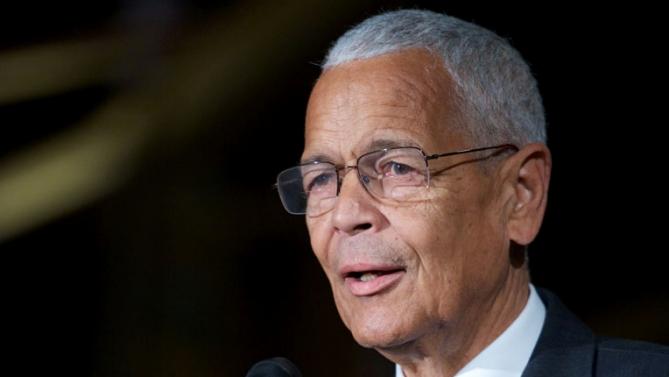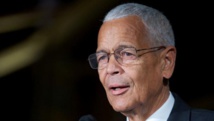"He advocated not just for African Americans, but for every group, indeed every person subject to oppression and discrimination."
Bond died after a brief illness, according to US media reports.
Originally from Tennessee, Bond was at the forefront of America's civil rights movement, which demanded equal rights for African Americans.
US President Barack Obama said he was "privileged" to call Bond a friend, and hailed him as a hero.
"Julian Bond helped change this country for the better. And what better way to be remembered than that," said Obama, the first African American president of the United States.
Bond was a founding member of the Student Nonviolent Coordinating Committee, and helped to organize protests at segregated facilities in the 1960s.
"Sit-ins" were being staged across the US South, inspired by four men who dared to sit at a whites-only lunch counter in Greensboro, North Carolina in 1960.
That movement ultimately triggered his involvement in the student movement in Georgia.
"When we had a critical mass, we said we were going to have a meeting at 'x' place this afternoon, and that was the beginning of the Atlanta student movement," he said in a 2013 interview with the Center for American Progress.
Looking back on the civil rights campaign of the 1960s and beyond, Bond said the movement was formed somewhat "unthinkingly."
"We didn't plot it, we didn't plan it. We didn't say, 'Now let's work on this issue. Now let's work on that issue.' The issues seemed to come to us," he said.
"And we grappled with them and said, 'Here is the best way to go about this thing. Here's poverty. Here's hunger. Here's something else. Here's absence of voting rights. Here's inability to sit at the lunch counter.'"
- 'Activist, icon, great man' -
Bond's career in student activism eventually led him to politics. He was elected to the Georgia House of Representatives in 1965 and went on to serve for two decades in the Georgia legislature.
He was a vocal opponent of the Vietnam War, and white members of the Georgia House of Representatives refused to seat him because of his opposition to the conflict, according to the NAACP.
The Supreme Court, in 1966, ruled that the House had denied Bond his freedom of speech and had to seat him.
In 1998, he became NAACP chairman and served for 11 years. He remained president emeritus of the Southern Poverty Law Center until his death.
Tributes started poured in as news of the pioneer's death spread.
"#JulianBond, a friend & fellow traveler who with courage, set the moral & academic tone of our generation. RIP," said civil rights activist Jesse Jackson on Twitter.
Former US attorney general Eric Holder, the first African American to hold the position, also paid his respects.
"Julian Bond -- activist, icon. A great man who made the gains of the next generation possible and the nation better. We owe him much," Holder tweeted.
Former president Bill Clinton and his wife Hillary said Bond "helped us to become a more perfect union and always pushed us to do better."
"I treasured every conversation I've had over several decades and marveled that as his hair turned grey, his brilliant mind, sharp wit and gifts of speech retained their youthful vitality and intensity," a statement added.
Bond's activism may have been inspired by his father, Horace Mann Bond, who was the first black president of Lincoln University.
His great grandmother was the slave mistress of a Kentucky farmer, according to The New York Times, and his grandfather was a clergyman.
House Democratic Minority Leader Nancy Pelosi praised Bond as "one of the great heroes of the civil rights movement."
Her counterpart in the Senate, Harry Reid, hailed an "American icon who will be remembered not only for his monumental impact in the fight for civil rights."
In his later years, Bond turned to education and was a distinguished visiting professor at American University in Washington, and also taught in the history department at the University of Virginia.
He published a book of essays, "A Time to Speak, A Time to Act" in 1972, and also wrote poetry and articles for various publications.
He is survived by his wife, Pamela Horowitz, a former attorney at the Southern Poverty Law Center, and his five children.
---------------------------------------------------------------------------------------------------------------------------
Bond died after a brief illness, according to US media reports.
Originally from Tennessee, Bond was at the forefront of America's civil rights movement, which demanded equal rights for African Americans.
US President Barack Obama said he was "privileged" to call Bond a friend, and hailed him as a hero.
"Julian Bond helped change this country for the better. And what better way to be remembered than that," said Obama, the first African American president of the United States.
Bond was a founding member of the Student Nonviolent Coordinating Committee, and helped to organize protests at segregated facilities in the 1960s.
"Sit-ins" were being staged across the US South, inspired by four men who dared to sit at a whites-only lunch counter in Greensboro, North Carolina in 1960.
That movement ultimately triggered his involvement in the student movement in Georgia.
"When we had a critical mass, we said we were going to have a meeting at 'x' place this afternoon, and that was the beginning of the Atlanta student movement," he said in a 2013 interview with the Center for American Progress.
Looking back on the civil rights campaign of the 1960s and beyond, Bond said the movement was formed somewhat "unthinkingly."
"We didn't plot it, we didn't plan it. We didn't say, 'Now let's work on this issue. Now let's work on that issue.' The issues seemed to come to us," he said.
"And we grappled with them and said, 'Here is the best way to go about this thing. Here's poverty. Here's hunger. Here's something else. Here's absence of voting rights. Here's inability to sit at the lunch counter.'"
- 'Activist, icon, great man' -
Bond's career in student activism eventually led him to politics. He was elected to the Georgia House of Representatives in 1965 and went on to serve for two decades in the Georgia legislature.
He was a vocal opponent of the Vietnam War, and white members of the Georgia House of Representatives refused to seat him because of his opposition to the conflict, according to the NAACP.
The Supreme Court, in 1966, ruled that the House had denied Bond his freedom of speech and had to seat him.
In 1998, he became NAACP chairman and served for 11 years. He remained president emeritus of the Southern Poverty Law Center until his death.
Tributes started poured in as news of the pioneer's death spread.
"#JulianBond, a friend & fellow traveler who with courage, set the moral & academic tone of our generation. RIP," said civil rights activist Jesse Jackson on Twitter.
Former US attorney general Eric Holder, the first African American to hold the position, also paid his respects.
"Julian Bond -- activist, icon. A great man who made the gains of the next generation possible and the nation better. We owe him much," Holder tweeted.
Former president Bill Clinton and his wife Hillary said Bond "helped us to become a more perfect union and always pushed us to do better."
"I treasured every conversation I've had over several decades and marveled that as his hair turned grey, his brilliant mind, sharp wit and gifts of speech retained their youthful vitality and intensity," a statement added.
Bond's activism may have been inspired by his father, Horace Mann Bond, who was the first black president of Lincoln University.
His great grandmother was the slave mistress of a Kentucky farmer, according to The New York Times, and his grandfather was a clergyman.
House Democratic Minority Leader Nancy Pelosi praised Bond as "one of the great heroes of the civil rights movement."
Her counterpart in the Senate, Harry Reid, hailed an "American icon who will be remembered not only for his monumental impact in the fight for civil rights."
In his later years, Bond turned to education and was a distinguished visiting professor at American University in Washington, and also taught in the history department at the University of Virginia.
He published a book of essays, "A Time to Speak, A Time to Act" in 1972, and also wrote poetry and articles for various publications.
He is survived by his wife, Pamela Horowitz, a former attorney at the Southern Poverty Law Center, and his five children.
---------------------------------------------------------------------------------------------------------------------------









 Home
Home Politics
Politics











